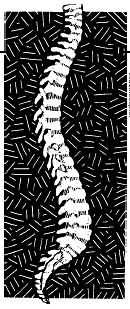Viewpoint
A grateful patient
By J. Brian Quinn (email)
Pain stops! For the first time in two and a half years! How blessed is the silence of nerves. How grateful I am for the Dartmouth-Hitchcock Spine Center in our rural paradise.
Like so many others' back afflictions, mine started with a deceptively simple act—picking up a single manuscript page from the edge of a bed. A sudden, searing twinge of pain. Stop! Walk it off! You've done it before so often. But not this time. First come the low-back cramps. Then the streaks of pain shooting down the leg. For weeks and months the pain continues. At first it is intermittent. Then continuous.
Everyone has advice. They've "been there" before you. Try this exercise. Try that anti-inflammatory. Try chiropractors, even acupuncture. Talk to your doc, to a physical therapist.
I do it all. But nevertheless—slowly but inexorably —the pain gets worse. Advice and results conflict more and more. I am confused. Can't sit, can't walk, can't see any way through the pain.

|
|
I had dreaded—indeed, feared—back surgery. What if they slipped? Missed? Failed? In a matter-of-fact way, they answer my endless questions, give me videotapes, let me decide. |
Innovation: Then comes the Spine Center. It is a health-delivery innovation that has given me back my active life. At its heart are people—an orthopedist, a neurosurgeon, an anesthesiologist, and a physical therapist. All are very human and friendly. They focus on me, on my problem, not on their particular skill and how to sell it. All look at the same MRI, the same history, the same charts simultaneously. They exchange views, give me confidence. They don't try to sell expensive solutions. Instead I hear, "Adjust your routines this way. Let's try noninvasive things further." Some relief ensues. That gets me through nine more months.
Then . . . wham! Once again hooting, almost continuous pain.
I had dreaded—indeed, feared—back surgery. What if they slipped? Missed? Failed? In a matter-of-fact way, they patiently answer my endless questions, give me videotapes, let me decide. What is the pain like? Sharp? Dull? Like a war wound? Or like a football injury? What about recovery? Probabilities of success?
They give me the best articles, the best advice available. Kind people, calm people dressed in spotless white or surgical green. Nice people, who answer phone calls quickly, helpfully, professionally, fully, sincerely, honestly. Who could possibly ask for more?
Finally, I know the right answer. I have the best surgeon and support team in New England right here at hand.
Then comes the morning of surgery. Calm assurance. Green- and pink-clad professionals in their own special world. The nurse who smiles and says, "Remember, think about something funny or very happy as you go to sleep. You'll feel better." The surgeon, unperturbed, who looks like he could walk on water. Butterfly fears disappear into deep sleep.
Dull awakening: Some time later, slowly, comes dull awakening. First fuzzy perception, then reality. Smiling wife, assuring words. Hovering green uniforms, kind hands, bringing me back to life. And, wonder of wonders, no pain! Help me stand. Help me walk. No pain. It's gone! Forever! Thanks! How can I ever thank you? Ever . . .
I bask in my own pool of curtains and comfort. Clean, cheerful, bright rooms, people, nurses. Five people are always available, helping, giving back strength with saintly hands and smiles. Several of us share our own service center, where helpers instantly appear, creating more comfort than would even be possible at home. Each patient is made to feel special, and our strength returns by the hour. Docs check, nurses check, everyone smiles.
My surgeon reappears for something like the 10th time. "Any pain?" he asks. "None!" I reply. He pumps his arm like Jimmy Connors: "Yessss!" The Spine Center—established in July 1998—is, like the other new care centers appearing at DHMC, a true jewel. World class surgeons, specialists, support staffs, and nursing care—talent and equipment found only in the world's best tertiary-care hospitals. And better yet, all this capability is working together as a team, in concert, toward one end—the patient, me.
Expertise: I have had three bits of surgery at DHMC over the last several years. Each was better in delivery and results than the last. The concept of team expertise focused on the patient—and the execution of the Spine Center and its remarkable people—will be hard to beat. The postsurgery follow-up was as friendly and complete as the highly technical presurgery process and the operation itself. I had to experience it all to believe how far superbly competent and caring people (and the world's best equipment) can go in relieving the worst stress, pain, and fears.
How can I ever thank all of those who made these technical innovations and this delivery of care possible?
I hope these few words will make a start on doing so.
Illustration by Suzanne DeJohn
In addition to being a recent patient of Dartmouth-Hitchcock's Spine Center, Brian Quinn is the William and Josephine Buchanan Professor of Management Emeritus at Dartmouth's Amos Tuck School of Business Administration. He is also the newly named chair of the Mary Hitchcock Memorial Hospital Assembly of Overseers.
Back to Fall 2000 Dartmouth Medicine
